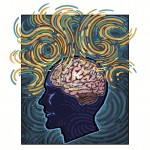
There is a considerable body of research that explores the links between depression and other diseases (e.g. cancer and cardiovascular disease). Many studies have also been published that investigate the relationship between depression and stroke, but the results are inconsistent.
Researchers from Harvard have now conducted a systematic review and meta-analysis of prospective cohort studies that assess the risk of stroke in people who are depressed. They searched electronic databases and by hand to find 28 studies, which included 317,540 patients in total (8,478 stroke cases) over a 2-29 year follow-up period.
The review used reliable methods to extract and pool data (fixed-effect and random-effects models) and evaluate publication bias (funnel plots and Begg test). Results were presented as pooled adjusted hazard ratios (HRs):
- 1.45 (95% CI, 1.29-1.63; P for heterogeneity <.001; random-effects model) for total stroke
- 1.55 (95% CI, 1.25-1.93; P for heterogeneity = .31; fixed-effects model) for fatal stroke (8 studies)
- 1.25 (95% CI, 1.11-1.40; P for heterogeneity = .34; fixed-effects model) for ischemic stroke (6 studies)
- The estimated absolute risk differences associated with depression were 106 cases for total stroke, 53 cases for ischemic stroke, and 22 cases for fatal stroke per 100,000 individuals per year
- The increased risk of total stroke associated with depression was consistent across most subgroups.
The review concluded that:
Depression is associated with a significantly increased risk of stroke morbidity and mortality.
Pan A, Sun Q, Okereke OI, Rexrode KM, Hu FB. Depression and risk of stroke morbidity and mortality: a meta-analysis and systematic review. JAMA. 2011 Sep 21;306(11):1241-9. [PubMed abstract]

Hi folks,
This piece of research comes as a surprise. Being a student RNMH I find this a very interesting read! Certainly something to think about when working with people with bi-polar disorder.